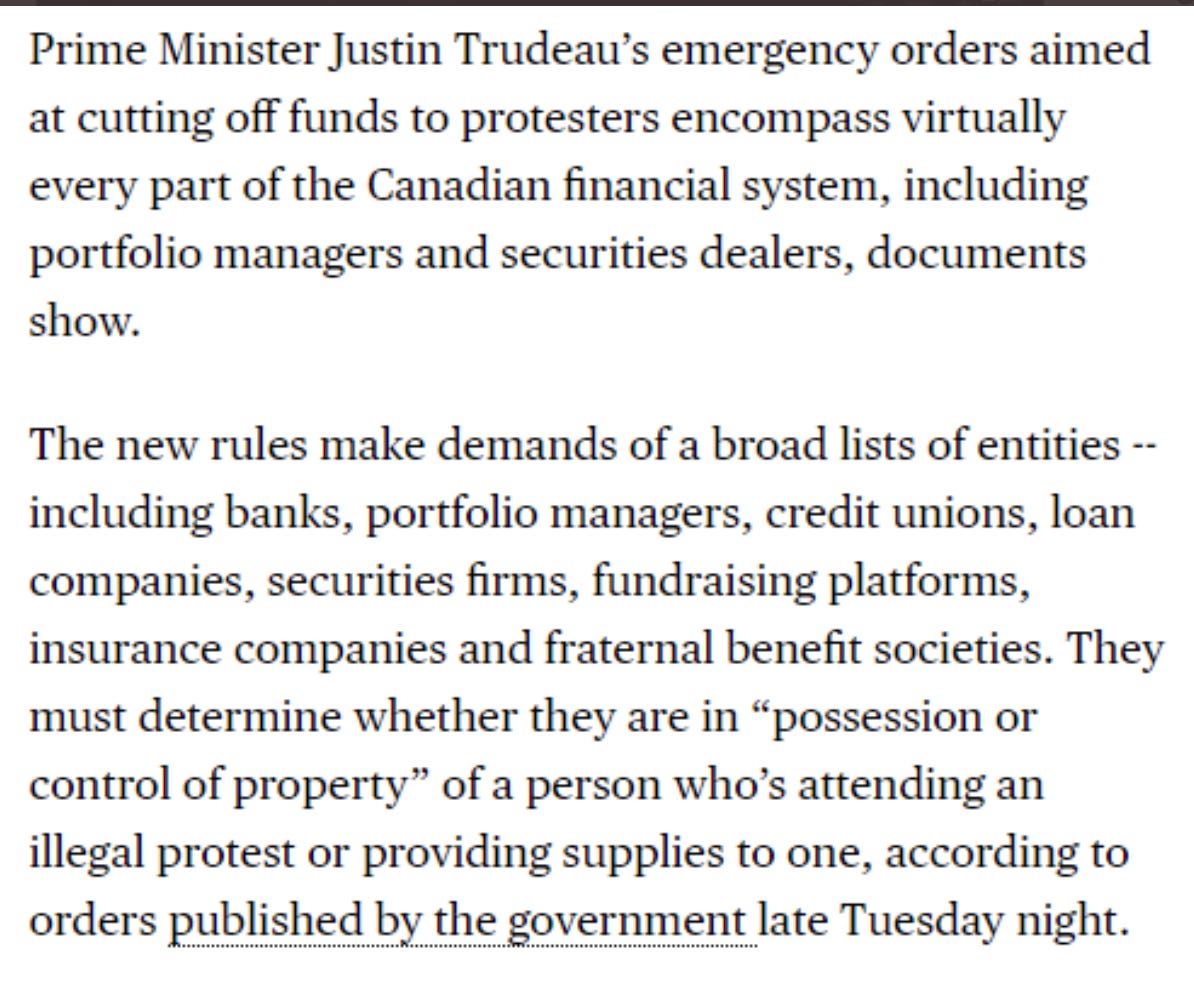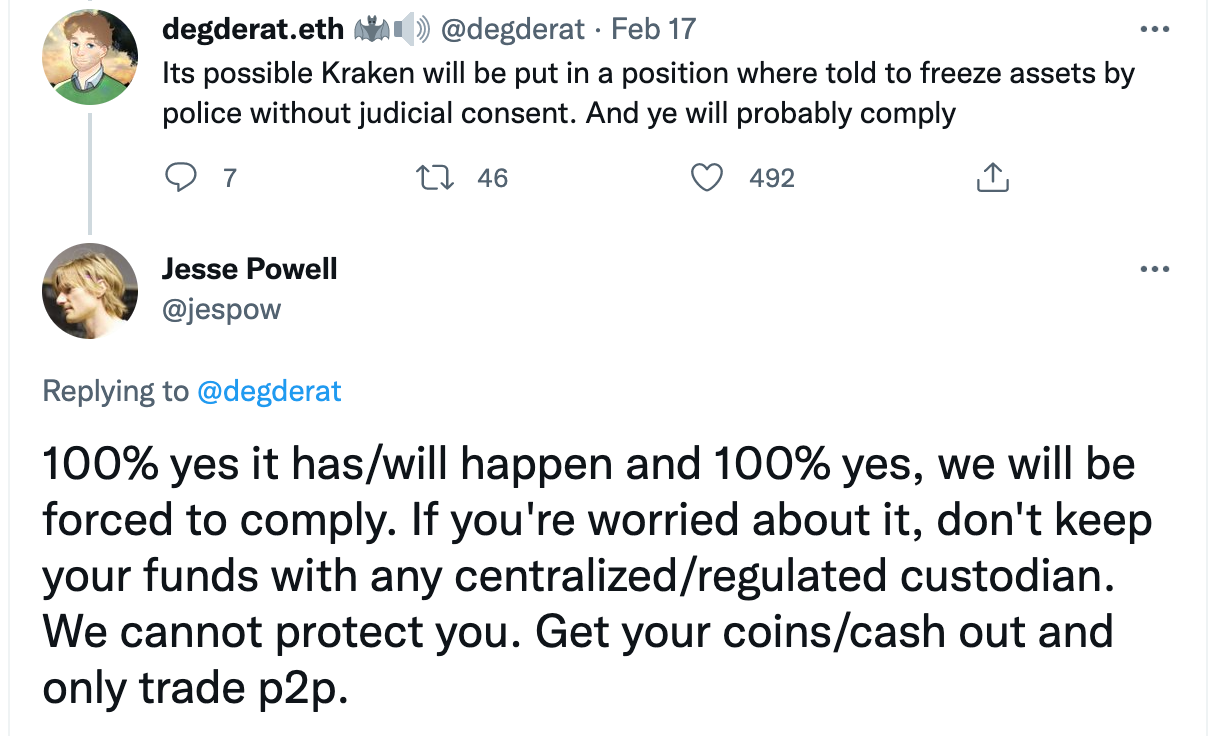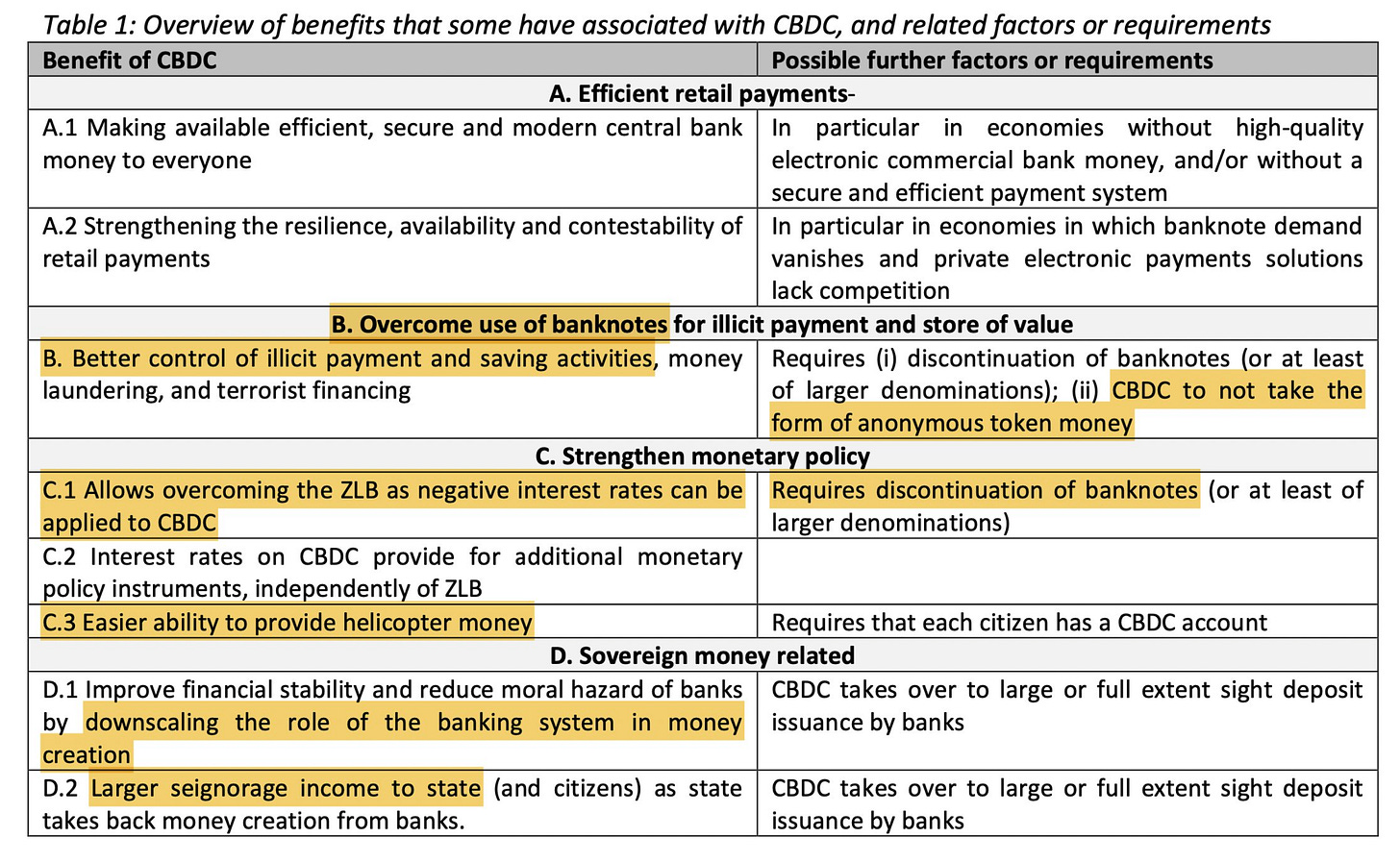Think Bitcoin™ Issue #24
Reimagining the collective with Bitcoin; trucker protests; philosophers on Bitcoin
Hey friends, welcome back to Think Bitcoin™ for issue #24. As always, if you have any questions or comments, feel free to reach out!
In this issue:
Headlines/Insights: Reimagining the collective with Bitcoin; the trucker protests in Canada
Content Round-Up: 2 podcasts, 2 articles
As always, if you find this newsletter interesting or useful, please share it with others who might find it interesting or useful, too!
Headlines and Insights
This past week I listened to a couple of different podcast episodes with Troy Cross, a professor of philosophy at Reed College (I will link to them in the Content Round-Up below). I found his ideas and his perspective thoroughly thought-provoking, clear-eyed, extremely well-articulated, and ethically grounded. Candidly, I was inspired, and he got me thinking about the underpinnings of what unfortunately seems to be a growing political divide over Bitcoin in America.
Reimagining the collective with Bitcoin
I’ve written about this before, specifically the ways in which I feel the political Left misunderstands Bitcoin and its potential to address many of the problems with which they are rightfully concerned. However, Troy really got me thinking about some of the first-principle conceptions of what a “good society” looks like that I think inform some of the Left’s skepticism toward the space.
Much of this political divide relates to beliefs about the responsibilities the government bears toward its citizens and the responsibilities citizens bear toward each other. The political Right putatively (though, these days, perhaps somewhat speciously) believes in less top-down intervention and more pull-yourself-up-by-your-bootstraps energy. There are fewer affirmative, collectively-owed duties. The primary duty governments owe citizens (and citizens each other) is essentially to leave well enough alone, don’t interfere unless crimes are being committed, and let every individual chart his course, the assumption being that this results in the fairest distribution of happiness without unnecessarily curtailing individual freedoms.
The Left, on the other hand, is much more collective-minded and espouses a much longer list of affirmative, collectively-owed duties. The Left of course recognizes that there are systemic flaws, many of which are deeply rooted in our history, which render each individual’s opportunity to chart his course decidedly unequal. Leaving well enough alone merely leaves an ossified, unfair system of advantages and disadvantages in place.
I think a big part of the Left’s seeming (though not monolithic) revulsion toward Bitcoin is the view that Bitcoin, by seeking to disintermediate the state from the control of money, removes the most obvious tool for addressing the Left’s concerns about fairness and equality of opportunity. For this reason, Bitcoin is viewed as an anti-collectivist, libertarian fantasy, which would do nothing to advance collective flourishing. This perception is obviously aided and reinforced by the vocal libertarian constituency within the Bitcoin community.
But I think the distinction many on the Left draw between themselves, as believers in a collective-minded society, and Bitcoiners, to whom they ascribe a more libertarian belief in the primacy of the individual and a reduction in responsibilities owed to any kind of collective, is a false one.
Many Bitcoiners are, in fact, very collectively-minded people. We’re not uniformly and categorically trying to abolish the idea of a collective or of shared responsibilities. Rather, many of us are trying to reimagine the idea of a collective and reimagine the contours of our relationship to each other and to the state.
The reason many of us believe in disintermediating the monetary network from the control of the state is not because we think all iterations of societal organization are inherently oppressive. It’s because we think government monopoly of money, and the endless manipulability attendant thereto, is itself one of the world’s most profound and self-perpetuating sources of oppression.
At the most basic level, when one’s money loses value over time, this has wide-ranging downstream effects. When life is (metaphorically) reduced to gathering water to store in a leaky bucket, you can never stop searching for more water. In fact, your existence revolves entirely around finding more water. If you stop, it runs out and you fall into destitution. This is what it’s like in a world of fiat currencies and engineered inflation. And this, consciously and subconsciously, informs how we relate to each other and how we relate to the state. It creates and cultivates a kind of interpersonal state of nature.
As a collective-minded Bitcoiner, I believe a money that not only retains its value over time but also grows in purchasing power will fundamentally change us. I believe it deconstructs the incentive structures of so many of our institutions and reconstructs better ones more conducive to human flourishing.
I will undoubtedly write more about this and expand on these ideas, but for now I just want to dispel some of the false distinctions being bandied about in political discussions around Bitcoin. You can believe in the collective good and in collective responsibility and be a Bitcoiner. These beliefs are not antithetical.
Case in point is how bitcoin mining can be used to green the electricity grid and actively, intelligently, scalably fight climate change, as described and explained by Troy Cross in the podcasts linked below.
The Canadian Truckers
While we’re on the topic of what is or isn’t ideologically consistent, regardless of whether you agree with the truckers in Ottawa who are protesting COVID-19 restrictions, the measures taken by the Canadian government only make more glaringly apparent the need for a censorship-resistant money that is not centrally controlled by the state.
If you haven’t been following this the last few weeks, Prime Minister Trudeau invoked the Emergencies Act for the first time since it was enacted in 1988 in order to quell the aforementioned protests. The Act gives him the authority to direct financial institutions to freeze any accounts suspected of being linked to the protestors, without a prior court order. These powers were exerted and, as Deputy PM Chrystia Freeland confirmed, bank accounts were, indeed, frozen.
The scope of these measures is more expansive than mere bank accounts, however. As Bloomberg reported:
Again, regardless of your opinion on the substance of the truckers’ grievances, the state’s ability to freeze bank accounts and restrict the financial freedom of citizens with whom it disagrees is chilling.
Alex Gladstein noted:
It also highlights the need for better privacy practices with Bitcoin. Take your coins off exchanges and custody them yourself. Coins that remain on exchanges are subject to state measures like the Emergencies Act, with which exchanges would have to comply. The CEO of Kraken acknowledged as much:
I think this is all a kind of preview for what the powers inherent to a central bank digital currency could look like. At present, your money is one “state of emergency” away from not being entirely your money. In the future, with CBDCs, the pretense of emergencies will likely not be required. Instead, governments will be able to craft monetary policy in an individualized way and wield this power punitively or coercively.
It’s not about whether you agree with the truckers. It’s about whether you own your money in (to use some property terms) fee simple absolute or fee simple determinable. If the former, you own it outright, end of story. If the latter, you own your money unless and until a stated condition occurs, at which point it reverts back to the grantor of that money. The situation in Canada is troubling (and, I think, a dark harbinger) because it bespeaks an ominous trend toward a reality in which your money belongs to you up until you express a dissident view.
Here’s an excerpt from a European Central Bank paper on the “benefits” of a CBDC:
As you can see, one of the “benefits” is the total lack of privacy. Another is increased (“better”) control.
Content Round-Up
1. “Can Bitcoin Mining Save the Environment?” In this episode of the What Bitcoin Did podcast, Troy Cross, professor of philosophy at Reed College, answers this question in the affirmative and explains why we need more (not less) bitcoin mining. If you’re someone who cares deeply about the environment and frets over Bitcoin’s energy usage, I heartily urge you to listen to this episode.
2. “A Philosopher Talks Bitcoin,” an episode of the Once Bitten podcast, featuring Troy Cross. Once you finish listening to Troy on What Bitcoin Did, check this one out. Troy talks about how he fell in love with Bitcoin, the state of academia in America, why the political left struggles with Bitcoin, and much more.
3. “Bitcoin Supports U.S. National Economic Strength,” an article by Matthew Pines in Real Clear Policy.
“To the extent that U.S. national strength rests on our energy resilience, technology innovation, capital growth, and liberal values, Bitcoin gives us a clear advantage over our adversaries. The time to take maximum advantage is now. More than just about any other country in history, the United States has adapted and led in times of challenge and change. Let’s do it one more time.”
4. “Why Bitcoin is a Tool for Social Justice,” an article by Charlene Fadirepo on Coindesk. In this piece, Fadirepo shares an excerpt from the new book she co-authored, Bitcoin and the American Dream, and explores how Bitcoin offers immigrant, Black, Indigenous, LGBTQ+ and other communities the promise of a more equitable financial system.
Bonus/Miscellaneous
In this interview clip with Jon Stewart, former Kansas City Fed President Thomas Hoenig describes the dollar as an entirely “faith-based” system that requires the confidence of people to sustain itself (“you got to have confidence in that currency, in the dollar, because there’s nothing backing it”).
So many people ask me how Bitcoin can be worth anything if it’s not backed by something. Or they’ll say Bitcoin requires people to believe in its value and is therefore without value. Well, here’s a former Fed President acknowledging what every Bitcoiner already knows about the dollar:

As always, thanks for reading! If you enjoyed it or found it useful, share this newsletter widely and freely!
“Civilization is in a race between education and catastrophe. Let us learn the truth and spread it as far and wide as our circumstances allow. For the truth is the greatest weapon we have.” -H.G. Wells
See you next week,
Logan
SUPPORT
Send bitcoin to my Strike
SOCIAL
DISCLAIMER: I am not investment advisor and this is not investment advice. This is not, nor is it intended to be, a recommendation to buy or sell any security or digital asset. Nothing in this newsletter should be interpreted as a solicitation, a recommendation, or advice to buy or sell any security or digital asset. Nothing in this newsletter should be considered legal advice of any kind. This newsletter exists for educational and informational purposes only. Do your own research before making any investment decisions.
© Copyright Logan Bolinger






